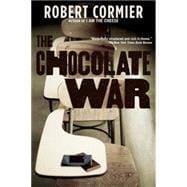
The Chocolate War
- ISBN13: 9780375829871
- ISBN10: 0375829873
- eBook ISBN(s): 9780307834294
- Additional ISBN(s): 9780440944591
- Edition: 30th
- Format: Paperback
- Copyright: 2004-09-14
- Publisher: Ingram Book Co
Note: Supplemental materials are not guaranteed with Rental or Used book purchases.
-
Your order must be $35 or more to qualify for free economy shipping. Bulk sales, PO's, Marketplace items, eBooks and apparel do not qualify for this offer.








